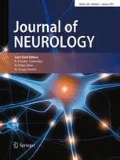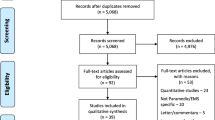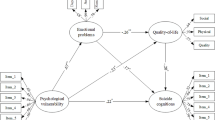Abstract
Objective
To investigate the factor structure of the Rivermead Post Concussion Symptoms Questionnaire (RPQ) among individuals seen as part of routine follow-up following traumatic brain injury.
Methods
RPQ data from 168 participants was examined (mean age 35.2, SD 14.3; 89% with post traumatic amnesia duration < 24 hours) six months after admission to an Accident & Emergency Department following TBI. Structural equation modelling was carried out to evaluate proposed models of the underlying structure of post-concussion symptoms (PCS).
Results
The results support the existence of separate cognitive, emotional and somatic factors, although there was a high degree of covariation between the three factors. A two-factor model that collapsed the emotional and somatic factors together showed a similar goodness-of-fit to the data, whilst a one-factor model proved a poor fit.
Conclusion
The results support the notion of post-concussion symptoms as a collection of associated but at least partially separable cognitive, emotional and somatic symptoms, although questions persist regarding symptom specificity. The use of the RPQ is discussed, and classification bands for use in clinical practice are suggested.



Similar content being viewed by others
References
Alexander MP (1995) Mild traumatic brain injury: Pathophysiology natural history and clinical management. Neurology 45:1253–1260
Alves W, Macciocchi SN, Barth JT (1993) Postconcussive symptoms after uncomplicated mild head injury. J Head Trauma Rehab 8:48–59
American Congress of Rehabilitation Medicine (1993) Definition of mild traumatic brain injury. J Head Trauma Rehab 8:86–87
American Psychiatric Association (1994) Diagnostic and Statistical Manual of Mental Disorders, 4th Edition (DSM-IV). APA, Washington D.C
Axelrod BN, Fox DD, Lees-Haley PR, Earnest K, Dolezal-Wood S (1998) Application of the Postconcussive Syndrome Questionnaire with medical and psychiatric outpatients. Arch Clin Neuropsych 13:543–548
Bazarian JJ, McClung J, Shah MN, Cheng YT, Flesher W, Kraus J (2005). Mild traumatic brain injury in the United States, 1998–2000. Brain Inj 19:85–91
Bazarian JJ, Wong T, Harris M, Leahy N, Mookerjee S, Dumbovy M (1999) Epidemiology and predictors of post-concussive syndrome after minor head injury in an emergency population. Brain Inj 13:173–189
Binder LM, Rohling ML (1996) Money matters: metaanalytic review of the effects of financial incentives on recovery after closed head injury. Am J Psychiat 153:7–10
Binder L, Rohling M, Larrabee G (1997) A review of mild head trauma. Part I: Meta-analytic review of neuropsychological studies. J Clin Exp Neuropsychol 19:421–431
Bohnen N, Jolles J, Twijnstra A, Mellink R, et al. (1995) Late neurobehavioural symptoms after mild head injury. Brain Inj 9:27–33
Bohnen N, Twijnstra A, Jolles J (1992) Post-traumatic and emotional symptoms in different subgroups of patients with mild head injury. Brain Inj 6:481–487
Bohnen N, Twijnstra A, Jolles J (1993) Persistence of postconcussional symptoms in uncomplicated mildly headinjured patients: A prospective cohort study Neuropsychiatry Neuropsych Behav Neural 6: 193-200
Bouchard M-E, Fortier M, Beland C, Belanger N, Cantin J-F, Pepin M (2003) Persistent concussion symptoms after mild head injury: Expectations as etiology. Brain Cognition 53:111
Chan RCK (2001) Base rate of post-concussion symptoms among normal people and its neuropsychological correlates. Clin Rehabil 15: 266–273
Cicerone KD, Kalmar K (1995) Persistent postconcussion syndrome: The structure of subjective complaints after mild traumatic brain injury. J Head Trauma Rehab 10:1–17
Crawford S, Wenden FJ, Wade DT (1996) The Rivermead head injury follow up questionnaire: a study of a new rating scale and other measures to evaluate outcome after head injury. J Neurol Neuros Psychiatry 60:510–514
Dikmen S, McLean A, Temkin N (1986) Neuropsychological and psychosocial consequences of minor head injury. J Neurol Neuros Psychiatry 49:1227–1232
Eames PG (2001) Distinguishing the neuropsychiatric, psychiatric, and psychological consequences of acquired brain injury. In: Wood RL, McMillan TH (eds) Neurobehavioural Disability and Social Handicap Following Brain Injury. Psychology Press, Hove, pp. 29–45
Emanuelson I, Andersson Holmkvist E, Björklund R, Stålhammar D (2003) Quality of life and post-concussion symptoms in adults after mild traumatic brain injury: a population-based study in western Sweden. Acta Neurol Scand 108:332–338
Englander J, Hall K, Stimpson T, Chaffin S (1992) Mild traumatic brain injury in an insured population: subjective complaints and return to employment. Brain Inj 6:161–166
Ferrari R, Constantoyannis C, Papadakis N (2001) Cross-cultural study of symptom expectation following minor head injury in Canada and Greece. Clin Neurol Neurosur 103:254–259
Ferrari R, Obelieniene D, Russell A, Darlington P, Gervais R, Green P (2001) Symptom expectation after minor head injury A comparative study between Canada and Lithuania. Clin Neurol Neurosur 103:184–190
Findler M, Cantor J, Haddad L, Gordon W, Ashman T (2001) The reliability and validity of the SF-36 Health Questionnaire for use with individuals with traumatic brain injury. Brain Inj 15:715–723
Frencham KR, Fox AM, Mayberry MT (2005) Neuropsychological studies of mild traumatic brain injury: A meta-analytic review of research since 1995. J Clin Exp Neuropsychol 27:334–351
Gerber DJ, Schraa JC (1995) Mild traumatic brain injury: Searching for a syndrome. J Head Trauma Rehab 10:28–40
Gordon WA, Haddad L, Brown M, Hibbard MR, Sliwinski M (2000) The sensitivity and specificity of self-reported symptoms in individuals with traumatic brain injury. Brain Inj 14:21–33
Gouvier WD, Cubic B, Jones G, Brantley P, Cutlip Q (1992) Postconcussion symptoms and daily stress in normal and head-injured college populations. Arch Clin Neuropsych 7:193–211
Gronwall D (1976) Performance changes during recovery from closed head injury. P Aust Neurol 13:143–147
Gunstad J, Suhr JA (2001) “Expectation as etiology” versus “the good old days”: Postconcussion syndrome symptom reporting in athletes, headache sufferers and depressed individuals. J Int Neuropsych Soc 7:323–333
Gunstad J, Suhr JA (2002) Perception of illness: Nonspecificity of postconcussion syndrome symptom expectation. J Int Neuropsych Soc 8:37–47
Haldorsen T, Waterloo K, Dahl A, Mellgren SI, Davidsen PE, Molin PK (2003) Symptoms and cognitive dysfunction in patients with the late whiplash syndrome. Appl Neuropsych 10:170–175
Hall S, Weinman J, Marteau TM (2004). The motivating impact of informing women smokers of a link between smoking and cervical cancer: The role of coherence. Health Psychol 23:419–424
Hanna-Pladdy B, Berry ZM, Bennett T, Phillips HL, Gouvier WD (2001) Stress as a diagnostic challenge for postconcussive symptoms: Sequelae of mild traumatic brain injury or physiological stress response. Clin Neuropsychol 15:289–304
Iverson GL, McCracken LM (1997) ‘Postconcussive’ symptoms in persons with chronic pain. Brain Inj 11:783–790
Iverson GL, Lange RT (2003) Examination of “postconcussion-like” symptoms in a healthy sample. Appl Neuropsych 10:137–144
Jacobson RR (1995) The post-concussional syndrome: physiogenesis psychogenesis and malingering, an integrative model. J Psychosom Res 39:675–693
Kay T (1993) Neuropsychological treatment of mild traumatic brain injury. J Head Trauma Rehab 8:74–85
King NS (1996) Emotional neuropsychological and organic factors: their use in the prediction of persisting postconcussion symptoms after moderate to mild head injury. J Neurol Neurosurg Psychiatry 61:75–81
King NS (1997) Mild head injury: Neuropathology sequelae measurement and recovery. Brit J Clin Psychol 36:161–184
King NS (2003) Postconcussion syndrome: Clarity amid the controversy. Br J Psychiat 183:276–278
King NS, Crawford S, Wenden FJ, Moss NEG, Wade DT (1995) The Rivermead Post Concussion Symptoms Questionnaire: A measure of symptoms commonly experienced after head injury and its reliability. J Neurol 242:587–592
King NS, Crawford S, Wenden FJ, Moss NEG, Wade DT, Caldwell FE (1997) Measurement of post-traumatic amnesia: How reliable is it? J Neurol Neuros Psychiatry 62:38–42
King NS, Crawford S, Wenden FJ, Caldwell FE, Wade DT (1999) Early prediction of persisting post-concussion symptoms following mild and moderate head injuries. Br J Clin Psychol 38:15–25
Lannoo E, Colardyn F, Vandekerckhove T, Deyne CD, Soete GD, Jannes C (1998) Subjective complaints versus neuropsychological test performance after moderate to severe head injury. Acta Neurochir (Wien) 140:245–253
Lees-Haley PR (1992) Neuropsychological complaint base rates of personal injury claimants. Forensic Reports 5:385–391
Lees-Haley PR, Fox DD, Courtney JC (2001) A comparison of complaints by mild brain injury claimants and other claimants describing subjective experience immediately following their injury. Arch Clin Neuropsych 16:689–695
Levin H, Mattis S, Ruff R, Eisenberg H, Marshall L, Tabaddor K, et al. (1987) Neurobehavioral outcome following minor head injury: a three-center study. J Neurosurg 66:234–243
Lishman WA (1988) Physiogenesis and psychogenesis in the post-concussional syndrome. Br J Psychiatry 153:460–469
Masson F, Maurette P, Salmi LR, Dartigues J-F, Vecsey J, Destaillats J-M, Erny P (1996) Prevalence of impairments 5 years after a head injury and their relationship with disabilities and outcome. Brain Inj 10:487–497
Mazaux JM, Masson F, Levin HS, Alaoui P, Maurette P, Barat M (1997) Long-term neuropsychological outcome and loss of social autonomy after traumatic brain injury. Arch Phys Med Rehab 78:1316–1320
McCauley SR, Boake C, Levin HS, Contant CF, Song JX (2001) Postconcussional disorder following mild to moderate traumatic brain injury: Anxiety depression and social support as risk factors and comorbidities. J Clin Exp Neuropsychol 23:792–808
McCullagh S, Feinstein A (2003) Outcome after mild traumatic brain injury: an examination of recruitment bias. J Neurol Neurosurg Psychiatry 74:39–43
McKinlay WW, Kilfedder C (1992) Financial compensation and head injury. Brain Inj 6:401–410
Mickeviciene D, Schrader H, Nestvold K, Surkiene D, Kunickas R, Stovner LJ, Sand T (2002) A controlled historical cohort study on the post-concussion syndrome. Eur J Neurol 9:581–587
Mickeviciene D, Schrader H, Obelieniene D, Surkiene D, Kunickas R, Stovner LJ, et al. (2004) A controlled prospective inception cohort study on post-concussion syndrome outside the medicolegal context. Eur J Neurol 11:411–419
Middelboe T, Andersen HS, Birket-Smith M, Friis ML (1992) Psychiatric sequelae of minor head injury a prospective follow-up study. Eur Psychiat 7:183–189
Mittenberg W, DiGiulio DV, Perrin S, Bass AE (1992) Symptoms following mild head injury: Expectation as aetiology. J Neurol Neurossurg Psychiatry 55:200–204
Moss-Morris R, Weinman J, Petrie K, Horne R, Cameron LD, Buick D (2002) The Revised Illness Perception Questionnaire (IPQ-R). Psychol Health 17:1–16
Nicholson K, Martelli MF, Zasler ND (2001) Does pain confound interpretation of neuropsychological test results? Neurorehabilitation 16:225–230
Oddy M, Humphrey M, Uttley D (1978) Subjective impairment and social recovery after closed head injury. J Neurol Neurosurg Psychiatry 41:611–616
Oddy M, Coughlan T, Tyerman A, Jenkins D (1985) Social adjustment after closed head injury: a further follow-up seven years after injury. J Neurol Neurosurg Psychiatry 48:564–568
Piland SG, Motl RW, Ferrara MS, Peterson CL (2003) Evidence for the factorial and construct validity of a self-report concussion symptoms questionnaire. J Athl Training 38:104–112
Rapoport MJ, McCullagh S, Streiner D, Feinstein A (2003) The clinical significance of major depression following mild traumatic brain injury. Psychosomatics 44:31–37
Rimel RW, Giordani B, Barth JT, Boll TJ, Jane JA (1981) Disability caused by minor head injury. Neurosurgery 9:221–228
Ruff RM, Camenzuli L, Mueller J (1996) Miserable minority: emotional risk factors that influence the outcome of mild traumatic brain injury. Brain Inj 10:551–565
Russell WR, Smith A (1961) Post traumatic amnesia in closed head injury. Arch Neurol 5:16–29
Rutherford WH, Merrett JD, McDonald JR (1979) Symptoms at one year following concussion from minor head injuries. Injury 10:225–230
Smith-Seemiller L, Fow NR, Kant R, Franzen MD (2003) Presence of post-concussion syndrome symptoms in patients with chronic pain vs mild traumatic brain injury. Brain Inj 17:199–206
Teasdale GM, Jennett B (1974) Assessment of coma and impaired consciousness. Lancet 304:81–84
Trahan DE, Ross CE, Trahan SL (2001) Relationships among postconcussional-like symptoms depression and anxiety in young adults and victims of mild head injury. Arch Clin Neuropsychiatry 16:435–445
Wade DT, Crawford S, Wenden FJ, King NS, Moss NEG (1997) Does routine follow-up after head injury help? A randomised controlled trial. J Neurol Neuros Psychiatry 62:478–484
Wade DT, King NS, Wenden FJ, Crawford S, Caldwell FE (1998) Routine follow up after head injury: A second randomised controlled trial. J Neurol Neurosurg Psychiatry 65:177–183
Wong JL, Regernitter RP, Barrios F (1994) Base rate and simulated symptoms of mild head injury among normals. Arch Clin Neuropsyc 9:411–425
Wood RL (2004) Understanding the ‘miserable minority’: a diasthesis-stress paradigm for post-concussional syndrome. Brain Inj 18:1135–1153
World Health Organization (1992) The ICD-10 Classification of Mental and Behavioural Disorders: Clinical Descriptions and Diagnostic Guidelines. WHO, Geneva
Wrightson P, Gronwall D (1981) Time off work and symptoms after minor head injury. Injury 12:245–254
Zasler ND, Martelli MF (2003) Mild traumatic brain injury: Impairment and disability assessment caveats. Neuropsychol Rehabil 13:31–41
Acknowledgements
The authors thank the Oxford Head Injury Service (F Caldwell, S Crawford, N King, N Moss & F Wenden) for their work in collecting the original data.
Author information
Authors and Affiliations
Corresponding author
Additional information
Received in revised form: 1 March 2006
Rights and permissions
About this article
Cite this article
Potter, S., Leigh, E., Wade, D. et al. The Rivermead Post Concussion Symptoms Questionnaire. J Neurol 253, 1603–1614 (2006). https://doi.org/10.1007/s00415-006-0275-z
Received:
Accepted:
Published:
Issue Date:
DOI: https://doi.org/10.1007/s00415-006-0275-z




